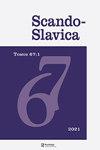Love’s Labour’s Lost, or A Russian Priest, Esperantist and Utopist in the Early 20 c. Japan
IF 0.2
0 HUMANITIES, MULTIDISCIPLINARY
引用次数: 0
Abstract
ABSTRACT Japan has always occupied a special place in the Russian mindscape. From the beginning of the first contacts and for the subsequent century and a half, the invariable pattern of reaction to Japan was the oscillation between rapturous expectations and a cold shower of encounters. This article offers an analysis of this paradigm of perception and a deconstruction of certain cultural and psychological traits of Russian visitors to Japan or residents of that country. Under scrutiny are their attitudes when confronted with the radical notion of otherness. Special emphasis is put on what impeded and what facilitated the intercultural dialogue. The article includes a case study which focuses on the voluminous memoirs (based on diaries) of the priest Innokentij Seryšev, who spent two and a half years in Japan in the late Taishō era (1920–1922). The main conclusion is that the invariant pattern of swinging perception of Japan from rhapsodic to threnodic, was influenced by objective causes. One of the principal reasons for this is the underestimation of the level of psychological and cultural differences between the Russians and the Japanese. Many cultural traits that looked agreeable were perceived by Seryšev without due context and a proper understanding of the foreign national and cultural matrix and without realizing his own limits in interpretation. These peculiarities of perception were (and sometimes still are) quite similar for many generations of Russian visitors/residents to/of Japan.《爱的徒劳》,或《俄罗斯牧师》,20世纪初日本的世界语主义者和乌托邦主义者
在俄罗斯人的心目中,日本一直占据着特殊的地位。从第一次接触开始到随后的一个半世纪,对日本的反应模式不变,即在欣喜若狂的期待和冷遇之间摇摆不定。本文对这种认知范式进行了分析,并解构了前往日本的俄罗斯游客或该国居民的某些文化和心理特征。他们在面对“他者”这个激进概念时的态度受到了审视。特别强调是什么阻碍了文化间对话,又是什么促进了文化间对话。这篇文章包括一个案例研究,其重点是牧师Innokentij Seryšev的大量回忆录(基于日记),他在大成时代晚期(1920-1922)在日本度过了两年半的时间。本文的主要结论是:日本认知从狂想曲到童话的不变摇摆模式受到客观原因的影响。造成这种情况的一个主要原因是低估了俄罗斯人和日本人在心理和文化上的差异。许多看起来令人愉快的文化特征是Seryšev在没有适当的背景和对外国民族和文化矩阵的适当理解的情况下感知到的,并且没有意识到他自己在解释方面的局限性。这些感知的特殊性(有时仍然是)对于许多代到日本的俄罗斯游客/居民来说非常相似。
本文章由计算机程序翻译,如有差异,请以英文原文为准。
求助全文
约1分钟内获得全文
求助全文

 求助内容:
求助内容: 应助结果提醒方式:
应助结果提醒方式:


